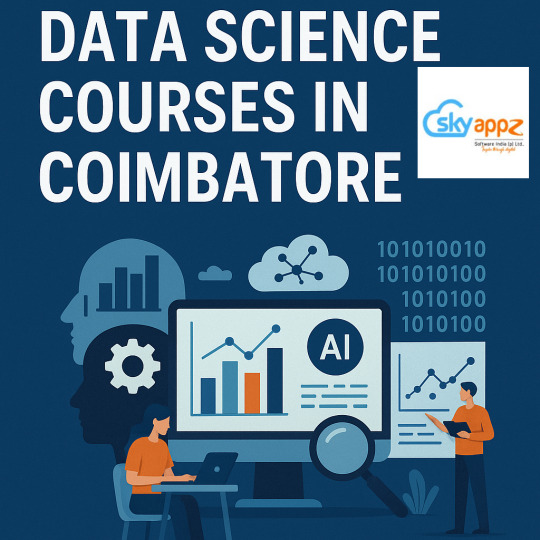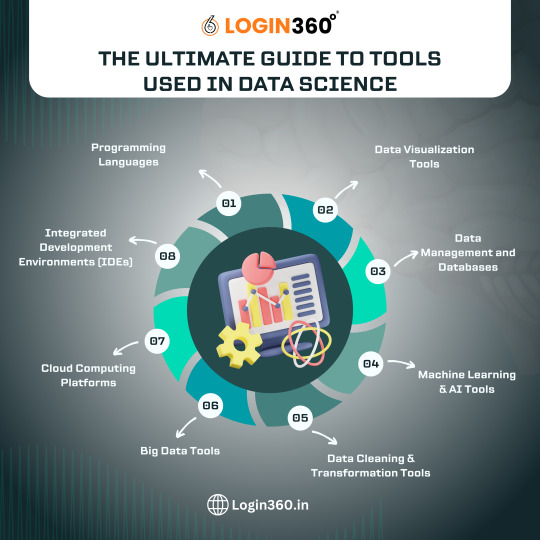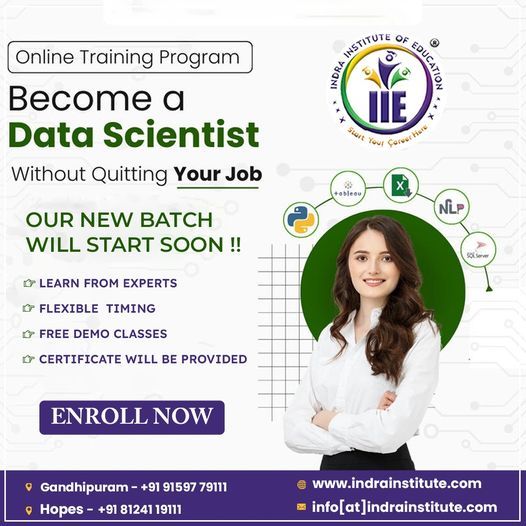#Data Science Course In Coimbatore
Explore tagged Tumblr posts
Text

Data science course in skyappz
Skyappz is one of best data science course with placement, will provide you with in-depth knowledge of data analysis applications such as data mining and machine learning. Learn what data science is and how it helps solve real problems. Start your journey in data science today with this easy guide.
1 note
·
View note
Text
Future Trends Covered in Modern Data Science Courses
Data science is changing fast as technology grows and more businesses use data to make decisions. To keep up, modern data science courses teach the latest tools, techniques, and ideas. In this blog, we’ll look at the future trends that data science courses now cover and how they prepare students for this exciting field.
1. Artificial Intelligence and Machine Learning
Learning AI and Machine Learning
Artificial Intelligence (AI) and Machine Learning (ML) are key topics in data science courses. Students learn advanced techniques such as:
Deep learning: Used for tasks like recognizing images or voices.
Reinforcement learning: Helps improve systems like robots or video games.
Transfer learning: Allows models to work well with less data.
Real-Life Uses of AI
Data science courses teach how AI is used in industries like healthcare, banking, and online shopping. Students work on projects like predicting sales, spotting fraud, or creating personalized recommendations.
2. Working with Big Data
Tools to Handle Large Amounts of Data
As the amount of data grows, students learn to use tools like:
Hadoop and Spark: To process data across many computers.
NoSQL databases: For organizing unstructured data.
Cloud platforms like AWS or Google Cloud: To store and process data online.
Why It Matters
These tools help students prepare for jobs where they’ll work with huge amounts of information, like in social media or e-commerce.
3. Ethical AI and Data Responsibility
Learning Ethics in AI
Using AI raises concerns about fairness and privacy. Courses now teach:
How to avoid bias: Making sure AI treats everyone fairly.
Data privacy rules: Understanding laws like GDPR.
Transparent AI: Creating systems that are easy to explain.
Why Ethics Is Important
Students learn how to create AI systems that respect people’s rights and build trust in technology.
4. Better Data Visualization and Storytelling
Visual Tools
Data visualization helps explain complex ideas. Students learn tools like:
Tableau and Power BI: To create interactive charts and dashboards.
Geospatial mapping: To show location-based data.
Programming tools like Plotly: For custom visualizations.
Telling Stories with Data
Courses also teach students how to combine visuals with clear explanations to make their data insights easy to understand for others.
5. Natural Language Processing (NLP)
What Is NLP?
NLP helps computers understand and work with text. Modern courses cover topics like:
Sentiment analysis: Analyzing customer reviews or social media posts.
Chatbots: Creating systems that can talk to people.
Text summarization: Making long documents easier to read.
Real-World Examples
Students practice using NLP to help businesses with tasks like analyzing customer feedback or translating languages.
6. Using Cloud Computing
What Is Cloud Computing?
Cloud platforms allow students to work on big projects without needing powerful computers. Courses teach tools like:
Google Colab: For team coding and model testing.
AWS and Azure: To store and analyze data in the cloud.
Snowflake: A tool for managing data efficiently.
Teamwork in Data Science
Students also learn to use collaboration tools like Git to work with others on data projects, which is important for real-world jobs.
7. Automating Data Science with Easy Tools
Low-Code Platforms
Automation is making data science easier for everyone. Courses now include tools like:
KNIME and Alteryx: To analyze data with little coding.
Google AutoML: To create machine learning models quickly.
Why It’s Useful
These tools help students focus more on solving problems and less on writing code, making data science more accessible.
8. Real-Time Data Processing
What Is Real-Time Data?
Real-time data is information that updates constantly, like stock prices or weather reports. Students learn tools such as:
Apache Kafka: To manage data streams.
Flink and Storm: For analyzing data as it comes in.
How It’s Used
These skills are useful in industries like banking, where decisions need to be made quickly, or in apps that track live updates.
9. Combining Data Science with Other Subjects
Interdisciplinary Learning
Modern courses often mix data science with other fields, such as:
Business: For market analysis.
Healthcare: To analyze patient data or medical images.
Environmental science: To study climate data.
Why It’s Important
This prepares students to use their skills in different industries, making them more versatile and employable.
10. Building Career Skills
Soft Skills Matter
Employers want data scientists who can do more than just crunch numbers. Courses now teach:
Communication: Explaining findings in simple terms.
Problem-solving: Tackling real-world challenges.
Leadership: Managing teams and projects.
Job Preparation
Many courses include resume workshops, mock interviews, and career advice to help students get hired after graduation.
Conclusion
Modern data science courses are adapting to the latest trends, ensuring students are ready for the future. By learning about AI, big data, ethics, cloud computing, and other key topics, students can gain the skills they need to succeed in this exciting field.
If you’re thinking about starting a data science course, look for programs that cover these future trends. They’ll help you stay ahead and prepare you for a data-driven world.
0 notes
Text
Open Source Tools for Data Science: A Beginner’s Toolkit
Data science is a powerful tool used by companies and organizations to make smart decisions, improve operations, and discover new opportunities. As more people realize the potential of data science, the need for easy-to-use and affordable tools has grown. Thankfully, the open-source community provides many resources that are both powerful and free. In this blog post, we will explore a beginner-friendly toolkit of open-source tools that are perfect for getting started in data science.
Why Use Open Source Tools for Data Science?
Before we dive into the tools, it’s helpful to understand why using open-source software for data science is a good idea:
1. Cost-Effective: Open-source tools are free, making them ideal for students, startups, and anyone on a tight budget.
2. Community Support: These tools often have strong communities where people share knowledge, help solve problems, and contribute to improving the tools.
3. Flexible and Customizable: You can change and adapt open-source tools to fit your needs, which is very useful in data science, where every project is different.
4. Transparent: Since the code is open for anyone to see, you can understand exactly how the tools work, which builds trust.

Essential Open Source Tools for Data Science Beginners
Let’s explore some of the most popular and easy-to-use open-source tools that cover every step in the data science process.
1. Python
The most often used programming language for data science is Python. It's highly adaptable and simple to learn.
Why Python?
- Simple to Read: Python’s syntax is straightforward, making it a great choice for beginners.
- Many Libraries: Python has a lot of libraries specifically designed for data science tasks, from working with data to building machine learning models.
- Large Community: Python’s community is huge, meaning there are lots of tutorials, forums, and resources to help you learn.
Key Libraries for Data Science:
- NumPy: Handles numerical calculations and array data.
- Pandas: Helps you organize and analyze data, especially in tables.
- Matplotlib and Seaborn: Used to create graphs and charts to visualize data.
- Scikit-learn: A powerful tool for machine learning, offering easy-to-use tools for data analysis.
2. Jupyter Notebook
Jupyter Notebook is a web application where you can write and run code, see the results, and add notes—all in one place.
Why Jupyter Notebook?
- Interactive Coding: You can write and test code in small chunks, making it easier to learn and troubleshoot.
- Great for Documentation: You can write explanations alongside your code, which helps keep your work organized.
- Built-In Visualization: Jupyter works well with visualization libraries like Matplotlib, so you can see your data in graphs right in your notebook.
3. R Programming Language
R is another popular language in data science, especially known for its strength in statistical analysis and data visualization.
Why R?
- Strong in Statistics: R is built specifically for statistical analysis, making it very powerful in this area.
- Excellent Visualization: R has great tools for making beautiful, detailed graphs.
- Lots of Packages: CRAN, R’s package repository, has thousands of packages that extend R’s capabilities.
Key Packages for Data Science:
- ggplot2: Creates high-quality graphs and charts.
- dplyr: Helps manipulate and clean data.
- caret: Simplifies the process of building predictive models.
4. TensorFlow and Keras
TensorFlow is a library developed by Google for numerical calculations and machine learning. Keras is a simpler interface that runs on top of TensorFlow, making it easier to build neural networks.
Why TensorFlow and Keras?
- Deep Learning: TensorFlow is excellent for deep learning, a type of machine learning that mimics the human brain.
- Flexible: TensorFlow is highly flexible, allowing for complex tasks.
- User-Friendly with Keras: Keras makes it easier for beginners to get started with TensorFlow by simplifying the process of building models.
5. Apache Spark
Apache Spark is an engine used for processing large amounts of data quickly. It’s great for big data projects.
Why Apache Spark?
- Speed: Spark processes data in memory, making it much faster than traditional tools.
- Handles Big Data: Spark can work with large datasets, making it a good choice for big data projects.
- Supports Multiple Languages: You can use Spark with Python, R, Scala, and more.
6. Git and GitHub
Git is a version control system that tracks changes to your code, while GitHub is a platform for hosting and sharing Git repositories.
Why Git and GitHub?
- Teamwork: GitHub makes it easy to work with others on the same project.
- Track Changes: Git keeps track of every change you make to your code, so you can always go back to an earlier version if needed.
- Organize Projects: GitHub offers tools for managing and documenting your work.
7. KNIME
KNIME (Konstanz Information Miner) is a data analytics platform that lets you create visual workflows for data science without writing code.
Why KNIME?
- Easy to Use: KNIME’s drag-and-drop interface is great for beginners who want to perform complex tasks without coding.
- Flexible: KNIME works with many other tools and languages, including Python, R, and Java.
- Good for Visualization: KNIME offers many options for visualizing your data.
8. OpenRefine
OpenRefine (formerly Google Refine) is a tool for cleaning and organizing messy data.
Why OpenRefine?
- Data Cleaning: OpenRefine is great for fixing and organizing large datasets, which is a crucial step in data science.
- Simple Interface: You can clean data using an easy-to-understand interface without writing complex code.
- Track Changes: You can see all the changes you’ve made to your data, making it easy to reproduce your results.
9. Orange
Orange is a tool for data visualization and analysis that’s easy to use, even for beginners.
Why Orange?
- Visual Programming: Orange lets you perform data analysis tasks through a visual interface, no coding required.
- Data Mining: It offers powerful tools for digging deeper into your data, including machine learning algorithms.
- Interactive Exploration: Orange’s tools make it easier to explore and present your data interactively.
10. D3.js
D3.js (Data-Driven Documents) is a JavaScript library used to create dynamic, interactive data visualizations on websites.
Why D3.js?
- Highly Customizable: D3.js allows for custom-made visualizations that can be tailored to your needs.
- Interactive: You can create charts and graphs that users can interact with, making data more engaging.
- Web Integration: D3.js works well with web technologies, making it ideal for creating data visualizations for websites.
How to Get Started with These Tools
Starting out in data science can feel overwhelming with so many tools to choose from. Here’s a simple guide to help you begin:
1. Begin with Python and Jupyter Notebook: These are essential tools in data science. Start by learning Python basics and practice writing and running code in Jupyter Notebook.
2. Learn Data Visualization: Once you're comfortable with Python, try creating charts and graphs using Matplotlib, Seaborn, or R’s ggplot2. Visualizing data is key to understanding it.
3. Master Version Control with Git: As your projects become more complex, using version control will help you keep track of changes. Learn Git basics and use GitHub to save your work.
4. Explore Machine Learning: Tools like Scikit-learn, TensorFlow, and Keras are great for beginners interested in machine learning. Start with simple models and build up to more complex ones.
5. Clean and Organize Data: Use Pandas and OpenRefine to tidy up your data. Data preparation is a vital step that can greatly affect your results.
6. Try Big Data with Apache Spark: If you’re working with large datasets, learn how to use Apache Spark. It’s a powerful tool for processing big data.
7. Create Interactive Visualizations: If you’re interested in web development or interactive data displays, explore D3.js. It’s a fantastic tool for making custom data visualizations for websites.
Conclusion
Data science offers a wide range of open-source tools that can help you at every step of your data journey. Whether you're just starting out or looking to deepen your skills, these tools provide everything you need to succeed in data science. By starting with the basics and gradually exploring more advanced tools, you can build a strong foundation in data science and unlock the power of your data.
#DataScience#OpenSourceTools#PythonForDataScience#BeginnerDataScience#JupyterNotebook#RProgramming#MachineLearning#TensorFlow#DataVisualization#BigDataTools#GitAndGitHub#KNIME#DataCleaning#OrangeDataScience#D3js#DataScienceForBeginners#DataScienceToolkit#DataAnalytics#data science course in Coimbatore#LearnDataScience#FreeDataScienceTools
1 note
·
View note
Text
Data science is the study of data to extract meaningful insights for business. Datamites is the leading training institute for data science course in coimbatore.
0 notes
Text
Data science is an interdisciplinary field that combines various techniques, tools, and methodologies to extract valuable insights and knowledge from data. Datamites is an organization that offers various courses and training programs in the field of data science, artificial intelligence, and machine learning.
0 notes
Text
If you're looking for the best Data Science course in Coimbatore with placement opportunities, look no further! Our comprehensive Data Science program is designed to equip you with the skills and knowledge required to excel in this rapidly growing field. We offer hands-on training in data analysis, machine learning, and big data technologies, delivered by industry experts with extensive experience.
0 notes
Text
Data science is a field of study that works with enormous amounts of data utilizing contemporary technologies and methodologies to uncover hidden patterns, obtain valuable information, and make business decisions. Datamites provides data science courses in Coimbatore along with artificial intelligence, python, data analytics, machine learning etc.
0 notes
Text
Data Science vs Data Analytics: The Best Path for Your Career in Coimbatore
Explore the key differences between Data Science and Data Analytics to choose the right career path in Coimbatore. Understand job roles, skills needed, and industry demand to make an informed decision that aligns with your career goals.
0 notes
Text
0 notes
Text

Best Data science courses in Coimbatore
Skyappz academy is the best data science course with placement in coimbatore, will provide you with in-depth knowledge of data analysis applications and machine learning.
#Best data science training institute in skyappz#Data science courses in skyappz#Data science#Data science courses in Coimbatore
0 notes
Text
Kickstart your tech career with the best Full Stack Development Course in Coimbatore! Learn front-end and back-end technologies like HTML, CSS, JavaScript, React, Node.js, and MongoDB from industry experts. Get hands-on training, real-time projects, internship support, and 100% placement assistance. Perfect for freshers and professionals looking to upskill!
📍 Coimbatore’s Trusted IT Training Institute 👉 Enroll Now: Full Stack Development Course in Coimbatore
#fullstackdevelopment#coimbatoretraining#aitraininginstituteincoimbatore#artificialintelligence#joborientedcourses#datasciencecoimbatore#machinelearning#pythontraining#skyappzacademy#top data science course in coimbatore
0 notes
Text

Explore the best "Data Science Course in Coimbatore" for professionals looking to enhance their data analysis and machine learning skills. Our comprehensive training covers everything from data visualization to predictive analytics. Take your career to the next level today!
0 notes
Text

Indra institute of Education is one among the Best Data Science courses in Coimbatore. We have trainers who are industry experts with more than 10+ years of experience in the Data Science field. We also provide the best Web Designing Training in Coimbatore for students who are aspiring for a career in web development. PHP is a high-level programming language also used in the cases of web developments.
For any queries contact us, 9159779111 or Visit Us: www.indrainstitute.com
#data science courses in coimbatore#Data Science Training Courses in Coimbatore#Best Data Science Certification Training Courses in Coimbatore#Data Science Training Course in Coimbatore#Data Analyst Course in Coimbatore with Placement#Data Science Training in Coimbatore#Certified Data Science Course In Coimbatore#data science offline course in coimbatore#Data Science Course Training in Coimbatore#Data Science Online Training in Coimbatore#Data Science Classes in Coimbatore
0 notes
Text
An artificial intelligence (AI) course is an educational program or training that focuses on teaching individuals the principles, techniques, and applications of artificial intelligence. Datamites is an organization that offers various courses and training programs in the field of data science, artificial intelligence, and machine learning.
0 notes
Text

The Python Course at Xplore IT Corp in Coimbatore offers comprehensive training for both beginners and professionals. The program includes hands-on projects, real-world applications, and interactive sessions to build strong Python programming skills. Students receive industry-recognized certification, placement assistance, resume preparation, and job interview support. The course covers key areas such as web development, data science, automation, and machine learning, making it ideal for anyone looking to start or advance their career in Python programming.
1 note
·
View note